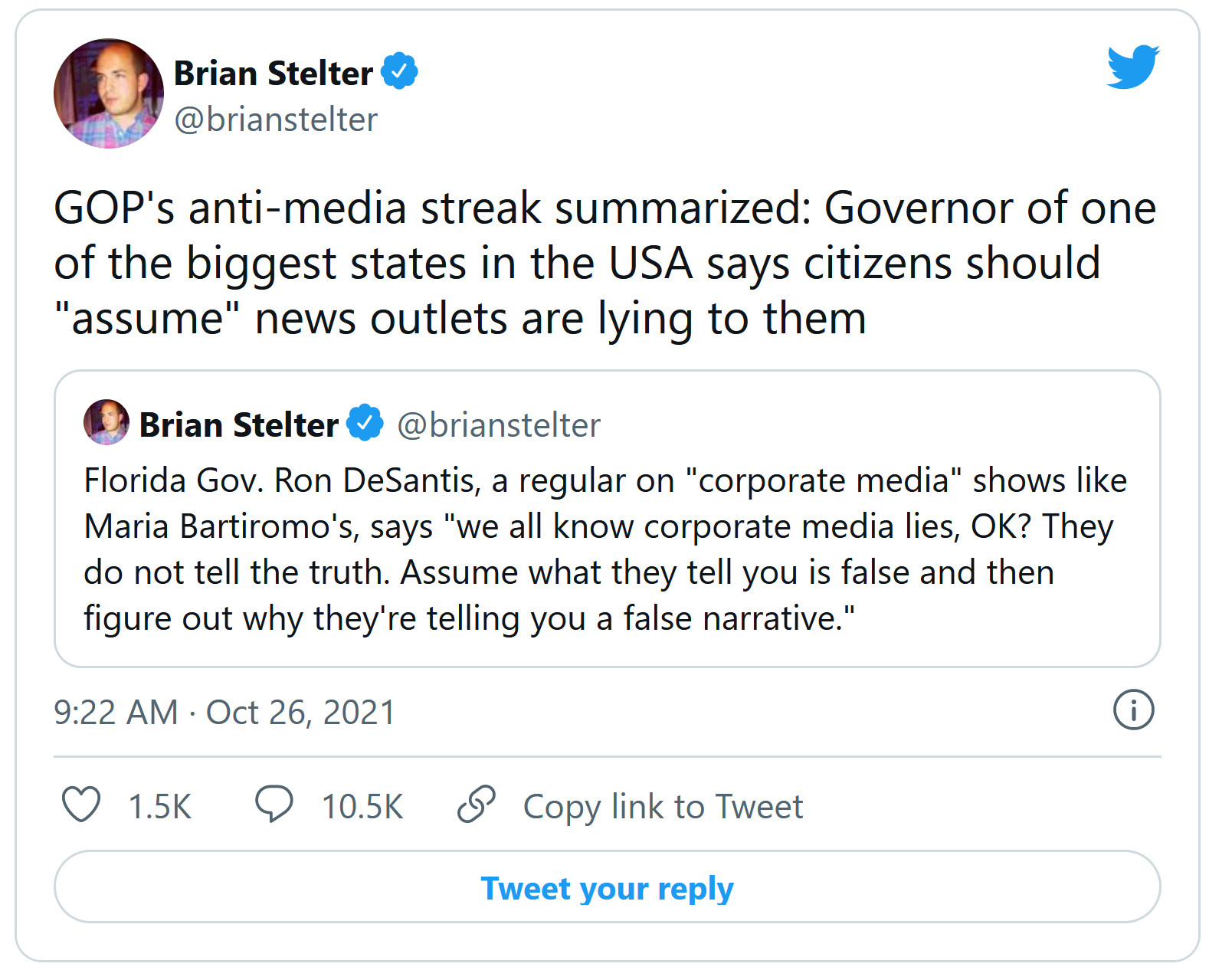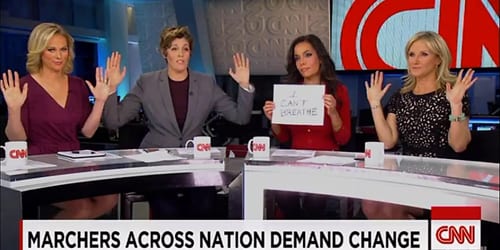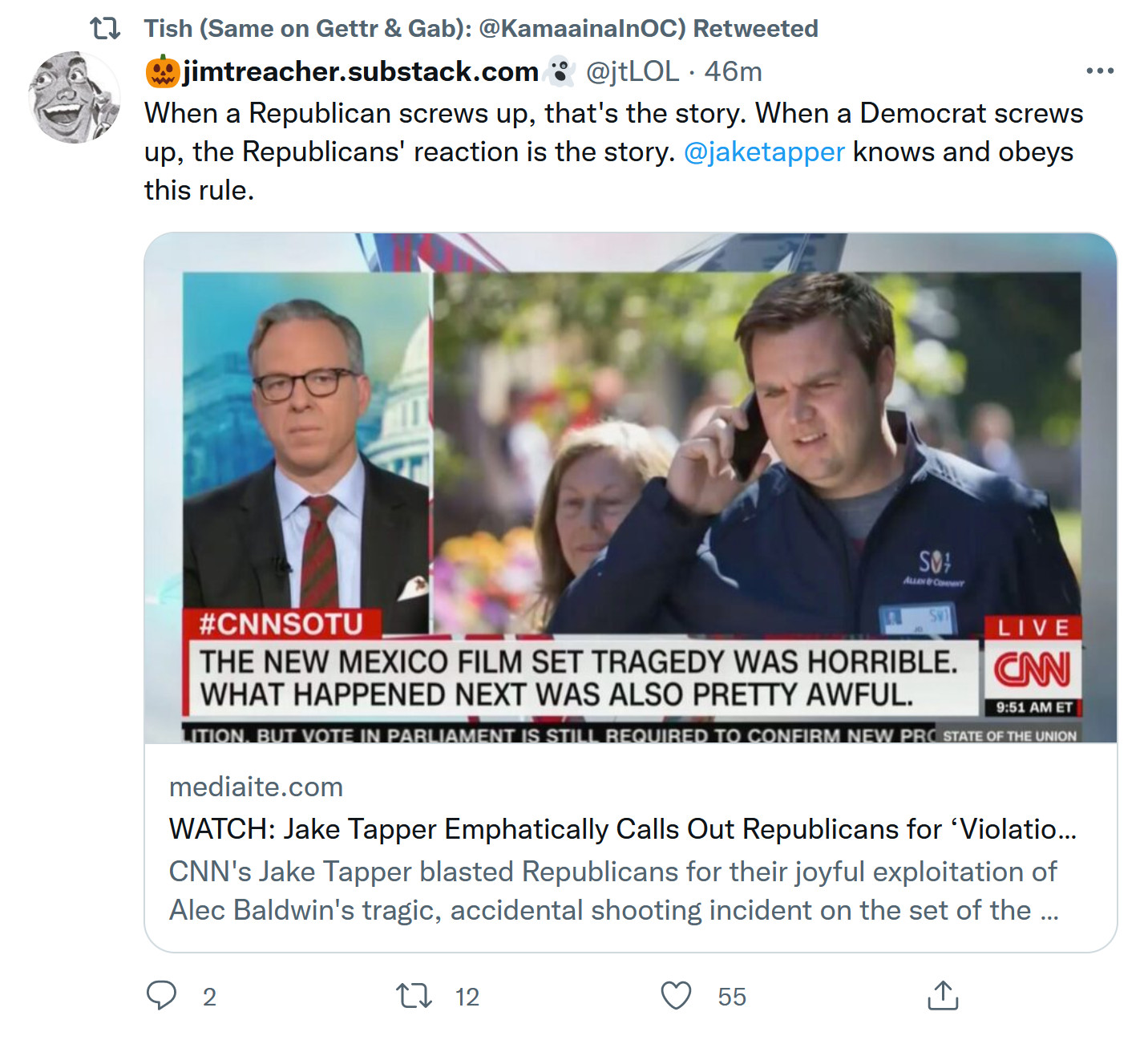QUESTION ASKED AND ANSWERED ‘Has CNN Lost Trust?’ Brian Stelter Explores the Consequences of the Chris Cuomo Scandal for His Network.
Flashbacks: CNN Host Angry Conservatives Don’t Trust the Media, But Here’s a Few Examples Why.
It wasn’t that long ago that CNN was falsely trying to tell you that Joe Rogan was treating his COVID-19 sickness with horse de-wormer and now a host on the same network is complaining that the right is somehow in the wrong for not believing the media.
This is, of course, right after they dedicated a segment advocating that the mainstream media should, indeed, discriminate against the right when it comes to reporting.
To give you some background, the drama started when Florida Governor Ron DeSantis appeared on Fox News and told Maria Bartiromo that the corporate media lies its head off that it’s pretty much a given at this point to not believe much of what they say.
This apparently upset the host of CNN’s ironically named “Reliable Sources,” Brian Stelter, who began ringing the alarm bell about the “GOP’s anti-media streak and made it seem as if people should be aghast that a leader of conservatives should be telling conservatives that the biased media controlled by the left lies about conservatives.

Gee, Brian, where to begin?


Dana Loesch: How CNN Set Me Up For The Near-Riot Parkland Town Hall.

And of course, even Stelter doesn’t believe what CNN tells him, particularly involving global warming:

And then there’s one of Stelter’s favorite guests on a show called “Reliable Sources:” A gentleman named Dan Rather.
As Glenn wrote in the aftermath of Rather’s meltdown in 2004:
The world of Big Media used to be a high-trust environment. You read something in the paper, or heard something from Dan Rather, and you figured it was probably true. You didn’t ask to hear all the background, because it wouldn’t fit in a newspaper story, much less in the highly truncated TV-news format anyway, and because you assumed that they had done the necessary legwork. (Had they? I’m not sure. It’s not clear whether standards have fallen since, or whether the curtain has simply been pulled open on the Mighty Oz. But they had names, and familiar faces, so you usually believed them even when you had your doubts.)
The Internet, on the other hand, is a low-trust environment. Ironically, that probably makes it more trustworthy.
That’s because, while arguments from authority are hard on the Internet, substantiating arguments is easy, thanks to the miracle of hyperlinks. And, where things aren’t linkable, you can post actual images. You can spell out your thinking, and you can back it up with lots of facts, which people then (thanks to Google, et al.) find it easy to check. And the links mean that you can do that without cluttering up your narrative too much, usually, something that’s impossible on TV and nearly so in a newspaper.
(This is actually a lot like the world lawyers live in — nobody trusts us enough to take our word for, well, much of anything, so we back things up with lots of footnotes, citations, and exhibits. Legal citation systems are even like a primitive form of hypertext, really, one that’s been around for six or eight hundred years. But I digress — except that this perhaps explains why so many lawyers take naturally to blogging).
You can also refine your arguments, updating — and even abandoning them — in realtime as new facts or arguments appear. It’s part of the deal.
This also means admitting when you’re wrong. And that’s another difference. When you’re a blogger, you present ideas and arguments, and see how they do. You have a reputation, and it matters, but the reputation is for playing it straight with the facts you present, not necessarily the conclusions you reach. And a big part of the reputation’s component involves being willing to admit you’re wrong when you present wrong facts, and to make a quick and prominent correction.
When you’re a news anchor, you’re not just putting your arguments on the line — you’re putting yourself on the line. Dan Rather has a problem with that. For journalists of his generation, admitting an error means admitting that you’ve violated people’s trust. For bloggers, admitting an error means you’ve missed something, and now you’re going to set it right.
What people in the legacy media need to ask themselves is, which approach is more likely to retain credibility over time? I think I know the answer. I think Dan Rather does, too.
That seems like pretty good advice. Naturally, Stelter completely ignores it, week after week.
